(完整版)高考英语反意疑问句讲解及练习
反义疑问句句知识点+习题
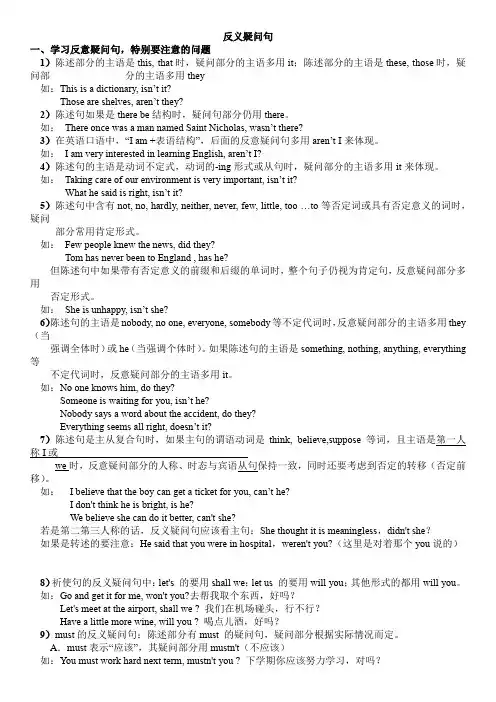
反义疑问句一、学习反意疑问句,特别要注意的问题1)陈述部分的主语是this, that时,疑问部分的主语多用it;陈述部分的主语是these, those时,疑问部分的主语多用they如:This is a dictionary, isn’t it?Those are shelves, aren’t they?2)陈述句如果是there be结构时,疑问句部分仍用there。
如:There once was a man named Saint Nicholas, wasn’t there?3)在英语口语中,“I am +表语结构”,后面的反意疑问句多用aren’t I来体现。
如:I am very interested in learning English, aren’t I?4)陈述句的主语是动词不定式,动词的-ing形式或从句时,疑问部分的主语多用it来体现。
如:Taking care of our environment is very important, isn’t it?What he said is right, isn’t it?5)陈述句中含有not, no, hardly, neither, never, few, little, too …to等否定词或具有否定意义的词时,疑问部分常用肯定形式。
如:Few people knew the news, did they?Tom has never been to England , has he?但陈述句中如果带有否定意义的前缀和后缀的单词时,整个句子仍视为肯定句,反意疑问部分多用否定形式。
如:She is unhappy, isn’t she?6)陈述句的主语是nobody, no one, everyone, somebody等不定代词时,反意疑问部分的主语多用they (当强调全体时)或he(当强调个体时)。
如果陈述句的主语是something, nothing, anything, everything 等不定代词时,反意疑问部分的主语多用it。
反义疑问句讲解及习题及答案
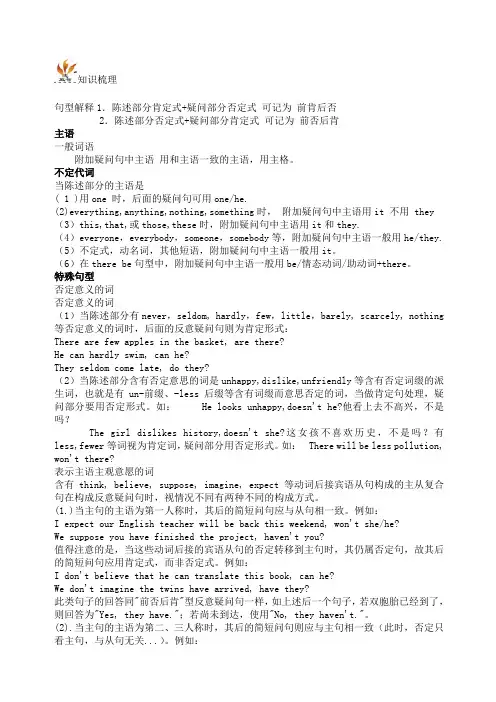
知识梳理句型解释1.陈述部分肯定式+疑问部分否定式可记为前肯后否2.陈述部分否定式+疑问部分肯定式可记为前否后肯主语一般词语附加疑问句中主语用和主语一致的主语,用主格。
不定代词当陈述部分的主语是( 1 )用one 时,后面的疑问句可用one/he.(2)everything,anything,nothing,something时,附加疑问句中主语用it 不用 they (3)this,that,或those,these时,附加疑问句中主语用it和they.(4)everyone,everybody,someone,somebody等,附加疑问句中主语一般用he/they. (5)不定式,动名词,其他短语,附加疑问句中主语一般用it。
(6)在there be句型中,附加疑问句中主语一般用be/情态动词/助动词+there。
特殊句型否定意义的词否定意义的词(1)当陈述部分有never,seldom, hardly,few,little,barely, scarcely, nothing 等否定意义的词时,后面的反意疑问句则为肯定形式:There are few apples in the basket, are there?He can hardly swim, can he?They seldom come late, do they?(2)当陈述部分含有否定意思的词是unhappy,dislike,unfriendly等含有否定词缀的派生词,也就是有un-前缀、-less后缀等含有词缀而意思否定的词,当做肯定句处理,疑问部分要用否定形式。
如:He looks unhappy,doesn't he?他看上去不高兴,不是吗?The girl dislikes history,doesn't she?这女孩不喜欢历史,不是吗?有less,fewer等词视为肯定词,疑问部分用否定形式。
如:There will be less pollution, won't there?表示主语主观意愿的词含有think, believe, suppose, imagine, expect等动词后接宾语从句构成的主从复合句在构成反意疑问句时,视情况不同有两种不同的构成方式。
英语反义疑问句讲解及练习题
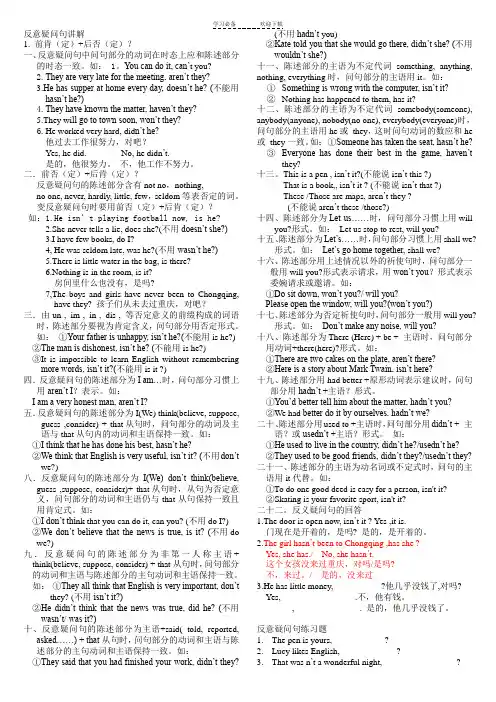
②We don’t believe that the news is true, is it? (不用do we?)
九.反意疑问句的陈述部分为非第一人称主语+ think(believe, suppose, consider) + that从句时,问句部分的动词和主语与陈述部分的主句动词和主语保持一致。如:①They all think that English is very important, don’t
No, she doesn’t. ___________________
17.You don’t study Chinese, do you?
翻译:Yes, we do. ________________
No, we don’t. _______________
18.Your friends didn’t have a good time without you last
1Something is wrong with the computer, isn’t it?
2Nothing has happened to them, has it?
十二、陈述部分的主语为不定代词somebody(someone), anybody(anyone), nobody(no one), everybody(everyone)时,问句部分的主语用he或they,这时问句动词的数应和he或they一致。如:①Someone has taken the seat, hasn’t he?
they? (不用isn’t it?)
②He didn’t think that the news was true, did he? (不用wasn’t/ was it?)
反义疑问句讲解与练习
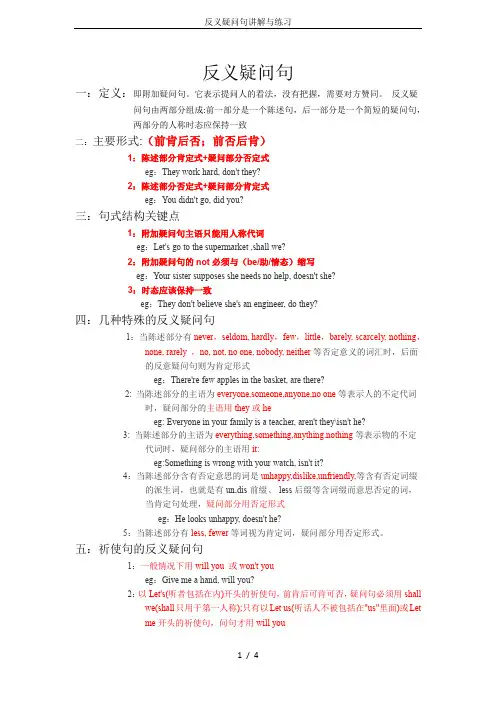
反义疑问句一:定义:即附加疑问句。
它表示提问人的看法,没有把握,需要对方赞同。
反义疑问句由两部分组成:前一部分是一个陈述句,后一部分是一个简短的疑问句,两部分的人称时态应保持一致二:主要形式:(前肯后否;前否后肯)1:陈述部分肯定式+疑问部分否定式eg:They work hard, don't they?2:陈述部分否定式+疑问部分肯定式eg:You didn't go, did you?三:句式结构关键点1:附加疑问句主语只能用人称代词eg:Let's go to the supermarket ,shall we?2:附加疑问句的not必须与(be/助/情态)缩写eg:Your sister supposes she needs no help, doesn't she?3:时态应该保持一致eg:They don't believe she's an engineer, do they?四:几种特殊的反义疑问句1:当陈述部分有never,seldom, hardly,few,little,barely, scarcely, nothing,none, rarely ,no, not, no one, nobody, neither等否定意义的词汇时,后面的反意疑问句则为肯定形式eg:There're few apples in the basket, are there?2:当陈述部分的主语为everyone,someone,anyone,no one等表示人的不定代词时,疑问部分的主语用they或heeg:Everyone in your family is a teacher, aren't they\isn't he?3:当陈述部分的主语为everything,something,anything.nothing等表示物的不定代词时,疑问部分的主语用it:eg:Something is wrong with your watch, isn't it?4:当陈述部分含有否定意思的词是unhappy,dislike,unfriendly,等含有否定词缀的派生词,也就是有un,dis-前缀、-less后缀等含词缀而意思否定的词,当肯定句处理,疑问部分用否定形式eg:He looks unhappy, doesn't he?5:当陈述部分有less, fewer等词视为肯定词,疑问部分用否定形式。
高考英语反意疑问句详解及练习
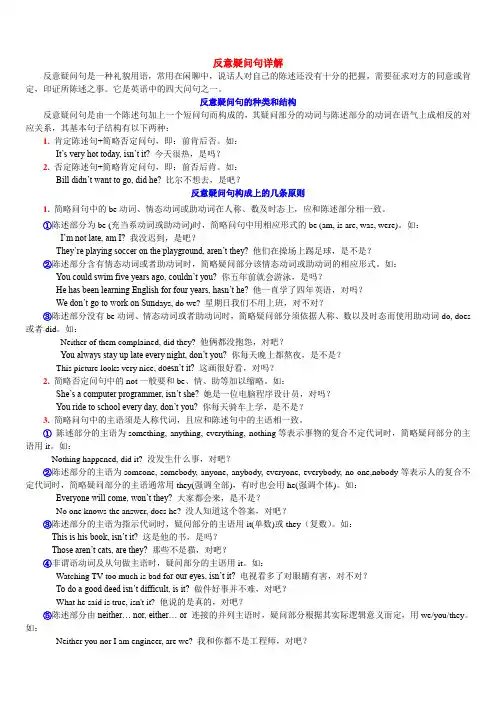
反意疑问句详解反意疑问句是一种礼貌用语,常用在闲聊中,说话人对自己的陈述还没有十分的把握,需要征求对方的同意或肯定,印证所陈述之事。
它是英语中的四大问句之一。
反意疑问句的种类和结构反意疑问句是由一个陈述句加上一个短问句而构成的,其疑问部分的动词与陈述部分的动词在语气上成相反的对应关系,其基本句子结构有以下两种:1. 肯定陈述句+简略否定问句,即:前肯后否。
如:It‟s very hot today, isn‟t it? 今天很热,是吗?2. 否定陈述句+简略肯定问句,即:前否后肯。
如:Bill didn‟t want to go, did he? 比尔不想去,是吧?反意疑问句构成上的几条原则1. 简略问句中的be动词、情态动词或助动词在人称、数及时态上,应和陈述部分相一致。
①陈述部分为be (充当系动词或助动词)时,简略问句中用相应形式的be (am, is are, was, were)。
如:I‟m not late, am I? 我没迟到,是吧?They‟re playing soccer on the playground, aren‟t they? 他们在操场上踢足球,是不是?②陈述部分含有情态动词或者助动词时,简略疑问部分该情态动词或助动词的相应形式。
如:You could swim five years ago, couldn‟t you? 你五年前就会游泳,是吗?He has been learning English for four years, hasn‟t he? 他一直学了四年英语,对吗?We don‟t go to work on Sun days, do we? 星期日我们不用上班,对不对?③陈述部分没有be动词、情态动词或者助动词时,简略疑问部分须依据人称、数以及时态而使用助动词do, does 或者did。
如:Neither of them complained, did they? 他俩都没抱怨,对吧?You always stay up late every night, don‟t you? 你每天晚上都熬夜,是不是?This picture looks very nice, d oesn‟t it? 这画很好看,对吗?2. 简略否定问句中的not一般要和be、情、助等加以缩略。
反义疑问句详细讲解及习题及答案-反意疑问句-反义疑问句题目及答案解析
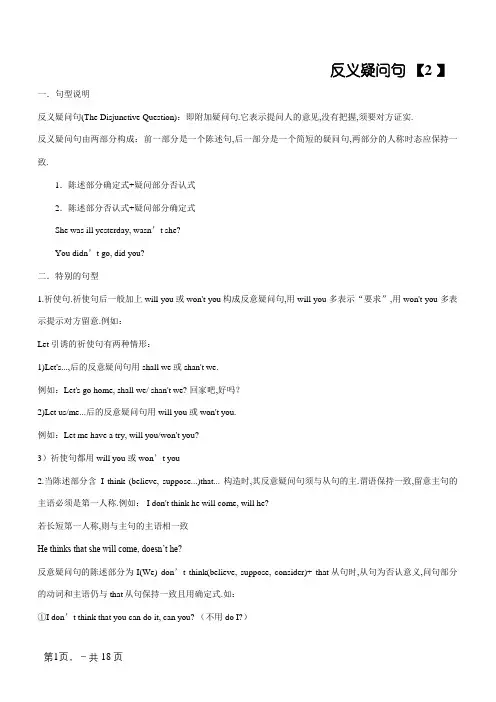
反义疑问句【2 】一.句型说明反义疑问句(The Disjunctive Question):即附加疑问句.它表示提问人的意见,没有把握,须要对方证实.反义疑问句由两部分构成:前一部分是一个陈述句,后一部分是一个简短的疑问句,两部分的人称时态应保持一致.1.陈述部分确定式+疑问部分否认式2.陈述部分否认式+疑问部分确定式She was ill yesterday, wasn’t she?You didn’t go, did you?二.特别的句型1.祈使句.祈使句后一般加上will you或won't you构成反意疑问句,用will you 多表示“要求”,用won't you 多表示提示对方留意.例如:Let引诱的祈使句有两种情形:1)Let's...,后的反意疑问句用shall we或shan't we.例如:Let's go home, shall we/ shan't we? 回家吧,好吗?2)Let us/me...后的反意疑问句用will you或won't you.例如:Let me have a try, will you/won't you?3)祈使句都用will you 或won’t you2.当陈述部分含I think (believe, suppose...)that... 构造时,其反意疑问句须与从句的主.谓语保持一致,留意主句的主语必须是第一人称.例如: I don't think he will come, will he?若长短第一人称,则与主句的主语相一致He thinks that she will come, doesn’t he?反意疑问句的陈述部分为I(We) don’t think(believe, suppose, consider)+ that从句时,从句为否认意义,问句部分的动词和主语仍与that从句保持一致且用确定式.如:①I don’t think that you can do it, can you? (不用do I?)②We don’t believe that the news is true, is it? (不用do we?)反意疑问句的陈述部分为主语+said( told, reported, asked……) + that从句时,问句部分的动词和主语与陈述部分的主句动词和主语保持一致.如:①They said that you had finished your work, didn’t they? (不用hadn’t you)②Kate told you that she would go there, didn’t she? (不用wouldn’t she?)3.当反意疑问句的陈述部分为从句时,若主句主语为I ,反意部分的主语为从句主语;若不为I ,反义部分的主语为主句主语.①I know your father is a worker, isn't he?①she knows your father is a worker, doesn’t she?4.当陈述部分含有以下这些含有否认意义的词时:few, little, seldom,hardly, never, not, no, no one, nobody, nothing, none, neither等,其反意疑问句需用确定构造.例如: He is never late for school, is he?5.当陈述部分所含的否认词是经由过程加前缀或后缀构成的,厥后的反意疑问句依旧用否认构造.例如:It is unfair, isn't it? 这不公正,是吧?6.陈述部分主.谓语是I am...时,反意疑问句用aren't I ,而不是am not I (可用am I not).例如:I'm working now, aren't I? 我在工作,是吗?7. 陈述部分的主语是 everybody, everyone, anybody, anyone, somebody, someone, nobody, no one, none, neither 时, 其反意疑问句的主语需用复数代词they.例如:Everyone is here, aren't they? 大家都到了,是吗?No one knows about it, do they? 没有人知道这件事,对吗?8.陈述部分的主语是everything, nothing, anything或something 时,反意疑问句的主语运用代词it.例如:Something is wrong with my radio, isn't it?我的收音机出缺点了,是吧?9.陈述部分的主语是指导代词this或that时,反意疑问句的主语用it,当陈述部分的主语是指导代词these或those 时,其反意疑问句的主语用they.例如:This is a plane, isn't it? 这是一架飞机,是吗?These are grapes,aren't they? 这些是葡萄,是吗?10.陈述部分的主语是不定代词one时,反意疑问句的主语可以用one,也可用you.例如:One should be ready to help others, shouldn't one?每小我都应当乐于助人,是吧?11. 当陈述部分谓语动词是need, dare,且这些词被用作实义动词时,其反意疑问句需用do的恰当情势.例如:He needs help, doesn't he?他须要关心,是吗?12.当陈述部分主语是从句.不定式(短语).动词-ing情势时,反意疑问句的主语应当用it.例如:What you need is more important, isn't it?你须要的器械更主要,是吧?12.have(has)不是表示“有”的意思,并在句中做谓语时,其反意疑问句的助动词要用do, does, did.例如:They had a meeting just now,didn't they?他们适才开了个会,是吗?15.陈述部分有have to 时,其反意疑问句要用助动词的否认情势.例如:You have to water the vegetables every day, don't you?You had to water the vegetables every day, didn't you?16.He used to stay up late, usedn’t he/ didn’t he?17.陈述部分是there be句型时,其反意疑问句中要用there.There was a hospital here, wasn't there?18.陈述部分有had better时,反意疑问句中要用hadn't.例如:We’d better go to school at once, hadn't we?He’d rather go home, wouldn’t he?19.当陈述部分含有情态动词must时,我们便要剖析一下must的寄义.假如must 作“必定;要;必须”讲,反意疑问句须用mustn't或needn't;而当must作推想意义“必定是;必定”讲时,反意疑问句则需依据must后的动词本相选用响应的情势.例如: He must work hard at physics, mustn't he?他必须尽力学物理,是吧?Tom must be at home,isn't he? 汤姆必定在家,是吧①He might have forgotten his pen in the classroom yesterday, didn’t he?(不用mightn’t he?/ hasn’t he?)②You must have got up late this morning, didn’t you?(不用mustn’t you?/haven’t you?)20.反意疑问句的答复用yes, no, 但是,答复意思相反,当陈述部分是否认情势时,答复要按事实.例如:They don’t work hard, do they?Yes, they do. 不,他们工作尽力./No, they don’t. 对, 他们工作不尽力.反意疑问句的陈述部分为I am……时,问句部分习惯上用aren’t I?表示.如:I am a very honest man, aren’t I?反意疑问句二反意疑问句是英语四大问句之一,它是由一个陈述句加上一个短问句而构成的.反意疑问句的根本构成情势是:陈述句+动词(确定或否认)+主语?如:①She often has lunch at school, doesn’t she? ②You don’t like sports, do you?一. 反意疑问句中问句部分的动词与陈述部分的动词在语气上成相反的对应关系,即:确定+否认?否认+确定?如:①You can’t do it, can you? ②They are very late for the meeting, aren’t they?二.反意疑问句中问句部分的动词与陈述部分的动词种类要对应一致.如:①He has supper at home every day, doesn’t he? (不能用hasn’t he?)②They have known the matter, haven’t they? (不能用don’t they?)三.反意疑问句中问句部分的动词在时态上应和陈述部分的时态一致.如:①They will go to town soon, won’t they?(不能用don’t they?或aren’t they?)②He works very hard, doesn’t he?(不能用didn’t he?或won’t he?)四.反意疑问句的陈述部分带有little, few, never, hardly, seldom等否认意义的词时,问句部分用确定式.如:①She never tells a lie, does she?(不用doesn’t she?)②He was seldom late, was he?(不用wasn’t he?)五.反意疑问句的陈述部分含有由un-, im-, in-, dis-, 等否认意义的前缀构成的词语时,陈述部分要视为确定寄义,问句部分用否认情势.如:①Your father is unhappy, isn’t he?(不能用is he?)②The man is dishonest, isn’t he? (不能用is he?)六.反意疑问句的陈述部分为I am……时,问句部分习惯上用aren’t I?表示.如:I am a very honest man, aren’t I?八.反意疑问句的陈述部分为I(We) don’t think(believe, suppose, consider)+ that从句时,从句为否认意义,问句部分的动词和主语仍与that从句保持一致且用确定式.如:①I don’t think that you ca n do it, can you? (不用do I?)②We don’t believe that the news is true, is it? (不用do we?)九.反意疑问句的陈述部分为非第一人称主语+ think(believe, suppose, consider) + that从句时,问句部分的动词和主语与陈述部分的主句动词和主语保持一致.如:①They all think that English is very important, don’t they? (不用isn’t it?)②He didn’t think that the news was true, did he? (不用wasn’t/ was it?)十.反意疑问句的陈述部分为主语+said( told, reported, asked……) + that从句时,问句部分的动词和主语与陈述部分的主句动词和主语保持一致.如:①They said that you had finished your work, didn’t they? (不用hadn’t you)②Kate told you that she w ould go there, didn’t she? (不用wouldn’t she?)十一.陈述部分的主语为不定代词something, anything, nothing, everything时,问句部分的主语用it.如:①Something is wrong with the computer, isn’t it?②Nothing has happened to them, has it?十二.陈述部分的主语为不定代词somebody(someone), anybody(anyone), nobody(no one), everybody(everyone)时,问句部分的主语用he或 they,这时问句动词的数应和he或 they一致.如:①Someone has taken the seat, hasn’t he?②Everyone has done their best in the game, haven’t they?十三.陈述部分为Let me……时,问句部分习惯上用shall I? 或will you?情势.如:Let me have a try, shall I?(will you?)十四.陈述部分为Let us……时,问句部分习惯上用will you? 陈述部分为Let’s……时,问句部分习惯上用shall we?如:Let us stop to rest, will you?Let’s go home together, shall we?十六.陈述部分用上述情形以外的祈使句时,问句部分一般用will you?情势表示要求,用won’t you?情势表示委婉要求或邀请.如:①Do sit do wn, won’t you?/ will you? ②Jim,you feed the bird today, will you?③Please open the window, will you?(won’t you?)十七.陈述部分为否认祈使句时,问句部分一般用will you?如:Don’t make any noise, will you?十八.陈述部分为There (Here) + be + 主语时,问句部分用动词+there(here)?.如:①There are two cak es on the plate, aren’t there?②Here is a story about Mark Twain, isn’t here?十九.陈述部分用had better +本相动词表示建议时,问句部分用hadn’t +主语?.①You’d better tell him about the matter, hadn’t you?②We had better do it by ourselves, hadn’t we?二十.陈述部分用used to +主语时,问句部分用didn’t + 主语?或usedn’t①He used to live in the country, didn’t he?/usedn’t he?②They used to be good friends, didn’t they?/usedn’t they?二十一.陈述部分用must(may, might) + have + V-ed表示推想时,若句中带有显著的曩昔时光的状语,问句部分动词用曩昔时情势.如:①He might have forgotten his pen in the cla ssroom yesterday, didn’t he?(不用mightn’t he?/ hasn’t he?)②You must have got up late this morning, didn’t you?(不用mustn’t you?/haven’t you?)二十二.陈述部分用must(may, might) + have + V-ed表示推想时,若句中没有带显著的曩昔时光的状语,问句部分动词用如今完成时情势.如:①Everyone must have known the death of the waitress, haven’t they? (不用mustn’t they?)②You must have worked there a year ago, didn’t you?(不用mustn’t you?/ haven’t you?)二十三.陈述部分的主语为从句时,问句部分的主语一般用it代替,如:①What he said is true, isn't it? (不用didn’t he?)②Where we will build the dam has not been decided yet, has it? (不用won’t we?)二十四.陈述部分的主语为动名词或不定式时,问句的主语用it代替.如:①To do one good deed is easy for a person, isn't it?②Skating is your favorite sport, isn't it?反意疑问句考点反意疑问句是高考主要考点,其构成情势是"确定 + 否认"和"否认 + 确定",但也有一些特例.本文联合高测验题,对反意疑问句的易考点进行归纳.1. 陈述句部分的谓语是be, had better或情态动词等时,反意疑问句仍用这些动词.[原题再现]Bill's aim is to inform the viewers that cigarette advertising on TV is illegal, ________?A. isn't itB. is itC. isn't heD. is he答案: A2. 陈述部分的谓语是have时,若have作"有"解,反意疑问部分用have (has) 或do (does)的确定或否认式; 若have作使役动词,则只能用do (does, did)的恰当情势进行反问.[原题再现]His wife had the front door painted green yesterday, ________she?A. didB. hadC. didn'tD. hadn't答案: C3. 陈述部分含有no, never, seldom, hardly, few, little, nowhere, nothing等否认意义的词时,反意疑问部分用确定情势;但陈述部分若运用含有否认意义的前缀或后缀的词时,反意疑问部分仍然运用否认情势.[原题再现]He seldom has lunch at school, ________?A. hasn't heB. has heC. doesn't heD. does he答案: DThey dislike English, don't they? 他们不爱好英语,不是吗?4、含有下列情态动词时构成的反意疑问句情势a.陈述句有had better时,问句顶用had (hadn’t) .You’d better go home now, hadn’t you?b.陈述句中有 must表示“必须”时问句用 needn't或 mustn'tYou must do your homework, mustn't you?/ needn't you?We mustn’t go home, must (need) we?c.must表示“推想”时,问句中则不能用情态动词,而须要用其它情势.如:She must be in the room, isn’t she?You must have been to Shanghai, haven’t you?[原题再现]There is no light in the dormitory. They must have gone to the lecture, ________?A. didn't theyB. don't theyC. mustn't theyD. haven't they答案: D5. 陈述部分的主语是everyone, everybody, anyone, anybody, someone, no one等不定代词时,其疑问部分的主语可依据句子的内在选用he或they.例如:Everyone knows his job, doesn't he?Everyone had lent you a hand when you were in trouble, hadn't they?6. 陈述部分的主语是something, anything, everything, nothing等不定代词,其疑问部分的主语一般用it.例如: Everything is ready, isn't it?Nothing goes well, does it?7. 陈述部分是there be句型时,反意疑问部分用"...there?".[原题再现]There's not much news in today's paper, ________?A. isn't itB. are thereC. is thereD. aren't there答案: C8. 陈述部分谓语含有used to时,反意疑问部分可用usedn't,也可用didn't;陈述部分含有ought to时,反意疑问部分可用oughtn't或shouldn't两种情势.例如:Tom used to make fun of Peter, usedn't / didn't he?We ought to learn the law knowledge by heart, oughtn't / shouldn't we?9. 陈述部分的主语是this, that,不定式短语.动名词短语或从句时,反意疑问部分的主语用it;陈述部分的主语是these, those时,反意疑问部分的主语用they.例如:This is a most wonderful place, isn't it?Learning a foreign language well takes a long time, doesn't it?That they are close friends doesn't seem true, does it?10. 陈述部分的主语后有同位语从句或定语从句润饰时,反意疑问部分仍应对主句主语进行反问.[原题再现]The news that they failed their driving test discouraged him, ________?A. did theyB. di dn't theyC. did itD. didn't it答案: D11. 陈述部分为含有宾语从句的主从复合句时,平日要对主句主语进行反问;但若陈述部分是"I (don't) think / suppose / believe / imagine / expect等 + 宾语从句"时,要对宾语从句的主语进行反问,同时要留意否认转移现象.[原题再现]I don't suppose anyone will volunteer, ________?A. do IB. don't IC. will theyD. won't they答案: C12. 陈述部分为祈使句时,不论祈使句是确定情势照样否认情势,反意疑问部分平日用will you;但Let's引起的祈使句的反意疑问句部分平日用shall we.[原题再现]If you want help-money or anything, let me know, ________ you?A. don'tB. willC. shallD. do答案: B13.陈述句部分是"I wish…"句型时,附加问句部分用may I.例如:I wish I were you, may I? 我愿望我是你,可以吗?I wish her to come here, may I? 我愿望她到这儿来,可以吗?猜测题1.Nobody says a word about the incident, ___________?A. is he B. doesn’t he C. do they D. don’t they2.You neve r told me why you were late for the class, ___________?A. weren’t you B. didn’t you C. had you D. did you3.They dare not call you a fool, ___________?A. would they B. dared they C. dares they D. dare they4.There is not much news in today’s paper, _____________?A. isn’t it B. are there C. is there D. aren’t there5.The manager came here in a car, ________?A. was he B. did he C. wasn’t he D. didn’t he6.She must have arrived there yesterday, _________?A. have she B. must she C. didn’t she D. mustn’t she7.Peter hardly ever goes to parties, _______?A. doesn’t he B. do he C. does he D. is he8.What a lovely day, _________?A. doesn’t it B. isn’t it C. shan’t it D. hasn’t it9.Let me do it, _______?A. shall I B. shall weC. will you D. will I10.Nothing he did was right, ___________?A. did he B. was it C. didn’t it D. was he11.There used to be a church behind the cemetery,________?A. didn’t there B. used there C. usedn’t itD. didn’t it12.He must be in the library now, ________?A. doesn’t he B. mustn’t he C. needn’t he D. isn’t he13.You would rather not have fish, _________ you?A. hadn’t B. wouldn’t C. would D. had14.----You are not a new member, are you? ---- _________. I joined only yesterday.A. No, I’m not B. Yes, I’m not C. No, I am D. Yes, I am15.My sister often ne eds help with her study, _______?A. need she B. needn’t she C. does she D. doesn’t she16.You’d better send for a doctor for your mother, ________ you?A. had B. hadn’t C. would D. wouldn’t17.Let’s go swimming, _________?A. aren’t we B. shall we C. will you D. won’twe18.Li Ming can’t be in the classroom, __________?A. can he B. is he C. can’t he D. must he19.He ought to have looked after his father, _________?A. oughtn’t he B. ought he not to C. oughtn’t he to D. oughtn’t to he20.I have nothing to do with the matter, ________?A. have I B. has it C. do I D. does it21.He was in good heath when I saw him last time, _________?A. wasn’t he B. didn’t he C. hadn’t he D. hasn’t he22.John had his hair cut yesterday afternoon, ________?A. haven’t he B. didn’t he C. hadn’t he D. hasn’t he23.None of the pupils attended the sports meet, ________?A. did they B. do they C. didn’t they D. don’t they24.I’d like to go with you,_______?A. had I B. wouldn’t I C. hadn’t I D. would I25.It is the third time that John has been late, ______?A. hasn’t he B. isn’t he C. isn’t it D. hasn’t it26.I suppose he is serious, ________?A. do I B. don’t I C. is he D. isn’t he27.She dislikes this skirt, _________?A. doesn’t she B. does she C. isn’t she D. is she28.You mustn’t tell it to your mother, ________?A. must you B. do you C. need you D. will you29.They have to face the difficulty,________?A. haven’t they B. don’t they C. do they D. must they30.The man in blue must be your brother,_______?A. mustn’t he B. needn’t he C. isn’t he D. is he答案与提示: 1.C当陈述部分中的主语为everybody, everyone, someone, no one, nobody, somebody等不定代词时,反意疑问句部分中的主语常用they.且陈述部分为否认意义的词nobody, 反意疑问部分运用确定情势.2.D当陈述部分是主从复合句时,反意疑问部分中的动词和主语代词平日应和主句中的动词和主语保持一致.3.D当陈述部分中含有情态动词dare 时,反意疑问部分也运用情态动词dare(没有人称和数的变化)4.C 陈述句部分含有not,是否认式,所以反意疑问部分运用确定式.并且当陈述部分是there be构造时,反意疑问部分用there,省略主语代词.5.D当陈述部分的动词是行动动词时,并且前面又没有任何助动词时,这时的疑问部分要用do/does/did.6.C假如must have done句式中的时光状语为表示曩昔的时光的词,如last year, yesterday, the day before yesterday等,反意疑问部分常用didn’t + 主语.7.C假如陈述部分已有表示否认意义的副词,如never, nothing, seldom, rarely, hardly等时,反意疑问部分运用确定情势.8.B当陈述句部分为感慨句时,反意疑问句部分常用否认情势,且问句部分的动词常用be.9.C当陈述部分是祈使句时,反意疑问部分常用will you.10.B当陈述部分的主语是everything, anything, nothing, something等表物的不定代词时,反意疑问部分的主语常用it.11.A 当陈述部分是there be构造时,反意疑问部分用there,省略主语代词.当陈述部分含有情态动词used to时,反意疑问部分可用used to情势或did情势.所以此空应填didn’t there 或usedn’t there.12.D must/ may/ can’t + do 表示对如今情形的推想,反意疑问部分用一般如今时.He must be in the library now.相当于I think he is in the library now.13.C当陈述句部分含had better/best, would like to, would rather等商定俗成特别短语时,反意疑问部分应保留第一个词.如斯题中的陈述部分含有would rather的否认式,则反意疑问部分用would.14.D反意疑问句的答语应依据现实情形来答复,假如事实是确定的,前面要用yes,不然用no.答复中的确定否认关系可以用下面这个公式表示:(+表示确定,-表示否认)问句中:+,-或-,+答复中:+,+或-,-15.D陈述句部分含有实义动词needs, 所以反意疑问部分要用助动词doesn’t.16.B当陈述部分有had better时,反意疑问部分运用hadn’t.17.B当陈述部分是祈使句时,反意疑问部分常用will you. 但以Let’s 开首的祈使句,反意疑问部分常用shall we.以Let us开首的祈使句,反意疑问部分常用will you.18.B当陈述部分含有情态动词must, may, can’t, 且表示推想时,反意疑问部分不能用must, may, can’t自身,应和后面的实义动词保持一致. Ling Ming can’t be in the classroom.相当于:I don’t think Li Ming is in the classroom.19.A当陈述部分含有情态动词ought to时,反意疑问部分常用oughtn’t.20.C本题中的陈述部分中的have是实义动词,不作“有”解,所以反意疑问部分应需借助助动词do, does, did等来完成.21.A当陈述部分是主从复合句时,反意疑问部分中的动词和主语代词平日应和主句中的动词和主语保持一致.此题的主句是:He was in good health.22.B本题中的陈述部分中的had是实义动词,不作“有” 解,所以反意疑问部分应需借助助动词did来完成.23.A当陈述部分的主语是everybody, everyone, someone, none, nobody, somebody等不定代词时,反意疑问句部分中的主语常用they.本题中的陈述句部分用的一般曩昔时态.24.B当陈述部分中有would like时,反意疑问部分运用wouldn’t.25.C当陈述句部分是强调句或相似强调句的构造时,反意疑问部分常和句首的It is/was 保持一致.26.D当陈述部分的主句是I suppose, I think, I believe, I imagine等构造时,反意疑问部分往往与从句保持一致,并且要留意否认转移.27.A当陈述部分中含有im, in, dis, un等否认前缀或less等否认后缀时,应把陈述部分算作是确定的,反意疑问部分要用否认式.28.A当陈述部分含有情态动词mustn’t表示“制止”时,反意疑问部分常用must.29.B当陈述部分含有have,并且have作“有”解时,反意疑问部分用have/has或借助助动词do, does, did 等来完成;假如陈述部分中的have是实义动词,则反意疑问部分应需借助助动词do, does, did等来完成.本题陈述部分中的have to (不得不)为实义动词,所以反意疑问部分不能用haven’t.30.C当陈述部分是must,may, can’t, 且表示推想时,反意疑问部分不能用must, may, can’t自身,应和后面的实义动词保持一致. 本题中的陈述部分The man in blue must be your brother相当于:I think the man in blue is your brother.反意疑问句演习二1. I suppose the shoes will last you at least one year, ____________?A. won’t theyB. will theyC. do ID. don’t2. Everyone is surprised at the news, _____________?A, is he B. are they C. aren’t they D. is not he3. ----- You will come to hav e dinner with us, won’t you?----- ____________A. Excuse me, I won’t.B. I haven’t been there.C. You are welcome.D. Yes. That’s very nice of you.4. Tom isn’t a hard-working student, for it is the third time he has been late, ______________?A. wasn’t itB. hasn’t itC. isn’t itD. hasn’t he5. You don’t have to go school on Sundays, _____________ you?A. haveB. doC. shouldD. would6. I don’t think he had his supper at the school, _____________?A. had heB. did heC. do ID. don’t you7.I don’t think he’d like to take such a difficult job, __________?A. had heB. would heC. do ID. don’t you8. I don’t think her passport’s gone, __________?A. is itB. has sheC. do ID. don’t you9. Do pay attention to my work and keep your eyes open all the time, ____________?A. will youB. don’t youC. shall weD. won’t we10. All the drivers dislike driving on the narrow roads ________________?A. don’t theyB. don’t each of themC. do ID. don’t you11. Let’s go and have a walk,___________?A. doB. shallC. haven’tD. shan’t12. Go and fetch a chair for him, ___________?A. don’t youB. shall youC. won’t youD. will y ou13. There used to be a shop behind the factory, ________________?A. didn’t thereB. used thereC. usedn’t it C. didn’t it14. I’m sure he must have been sleeping at the moment, __________?A. aren’t I B, mustn’t C. wasn’t he D. hasn’t15. I had to tell the truth, __________?A. hadn’t IB. wouldn’t IC. didn’t ID. shouldn’t I16.------- Why is Tom absent now ?-------He must be sick,________________?A. isn’t heB. must heC. is heD. mustn’t he17, He’d li ke to have a look at your picture,_________-he ?A. hadn’tB. didn’t C .couldn’t D .wouldn’t18. You don’t think he will come,_________?A. do youB. will youC. will heD. won’t he19. Let’s go home, shall we? _________.A. That’s right.B. That’s allC. That’s all rightD. All right20. Jack had dinner with his mother at home yesterday,A. didB. doesC. didn’tD. hadn’t21. Let John finish the work all by himself,___________?A. shall weB. will youC. do youD. do we22.I don’t think it is going to rain, _____________ it?A. do IB. do youC. isD. isn’t23. Nothing the boy did was right, _______ it?A. wasB. didC. wasn’t C. didn’t24. It’s the first time that she has been to the United States, ____________?A. isn’t sheB. isn’t itC. hasn’t sheD. hasn’t it25. He was hardly able to stand on his feet after the car accident,__________ he?A. couldB. coul dn’tC. wasD. wasn’t26. Jack seldom goes to the park, _______________?A. does heB. doesn’t heC. does JackD. doesn’t Jack27. People use tag question (反意疑问) because they are not sure of what they have said _____________they?A. doB. didC. didn’tD. don’t28. Everyone wants to be chosen for the work, ____________?A. isn’t heB. does heC. don’t theyD. do they29. She is going to see you ,_________ she ?A. isn’tB. isC. don’tD. doesn’t30. They used to live in these mountain areas ,_____________ they?A. didB. didn’tC. usedD. weren’t31. He ought to go by plane, _____he ?A. shouldn’tB. wouldn’tC. s houldD. would32. Lovely weather! ___________?A. Yes. You are right.B. Yes ,isn’t itC. No, it isD. No, you are wrong33. ---------- You must do as I tell you.----------Oh, I must, ____________I?A. shouldB. mustn’tC. oughtD. must34. We must start earlier,__________ we?A. needn’tB. mustn’tC. don’tD. mustn’t35. You must have studied English for many years, _________ you?A. didn’tB. haven’tC. needn’tD. mustn’t36. She must have arrived there yesterday, __________ she ?A. didn’tB. hasn’tC. needn’tD. mustn’t37. We mustn’t be late, __________ we?A. mustB. mayC. areD. A&B38, I needn’t show her the keys to the question, ________ I?A. mustB. needC. canD. do39. We need to practice speaking English more often, ___________ we?A. mustn’tB. needn’tC. can’tD. don’t40. I have to work this afternoon,__________ I? A. don’t C, haven’t D. do KEY. 1--10 ACDCB BBAAA 11-20 BDACC ADADC21-30 BCABC ADCAB 31-40 ABDAB ADBDC。
(完整)反义疑问句讲解和练习(答案)
反意疑问句一、英文中的反意疑问句。
1、什么是反意疑问句英语中,反意疑问句是由陈述句和附在其后的附加疑问句组成。
其中附加疑问句是对陈述句所说的事实或观点提出疑问,起证实作用,一般用于证实说话者所说的事实或观点.翻译为“是吗”2。
反意疑问句的回答,回答时,如果情况属实,用Yes加上反问句的倒装肯定句;若果情况不属实,则用No 加上反问句的倒装否定句。
例如You were moved by your students,weren’t you?情况属实:Yes, I were.情况不属实:No, I weren’t。
二、反意疑问句中问句部分的动词与陈述部分的动词在语气上成相反的对应关系,即:肯定+否定?否定+肯定?如:①You can't do it, can you?你不能做它,是吗?②They are very late for the meeting, aren’t they?他们开会迟到了,是吗?三.当陈述句中含有be动词,助动词,或是情态动词时,反问句部分由这些词加上主语人称代词构成。
She is a lovely girl,isn’t she?她是一个可爱的女孩,是吗?He will go home, __won’t__ __he__?他要回家了,是吗?She doesn’t l ike to eat popcorn, __does__ _she___?她不喜欢吃爆米花,是吗?The baby won't sleep early, will it?小宝宝睡得不早,是吗?注意:He has supper at home every day,doesn’t’t he? (不能用hasn’t he?)他每天在家吃晚饭,是吗?They have known the matter,haven’t they? (不能用don’t they?)他们已经知道那事情了,是吗?小试牛刀:It’s very hot today, _______________ ?He can speak Chinese, _______________ ?It _______________ a good day for swimming, is it?Tom has been to Singapore , _______________ ?She do esn’t like climbing hills , _______________ ?四.当陈述句中只含有行为动词时,若动词加了s,就用does, 若动词为原形,就用do,动词为过去式,则用did,例如:You cleaned your house last week, _didn’t___ __you__?你上周打扫了你的房间,是吗?Your father plays the computer very well, __doesn’t__ ___he _?你父亲电脑技术很好,是吗?They look so happy today, _don’t ___ _they___?你今天看起来很高兴,是吗?小试牛刀: Meimei studies in a middle school, _______________ ?He loves cold weather , _______________ ?You finished the task yesterday, _______________ ?五.反意疑问句的陈述部分带有little, few, never, hardly, seldom,nobody, nothing,barely, scarcely等否定意义的词时,问句部分用肯定式.如:①She never tells a lie, does she?(不用doesn’t she?)她从不说谎,是吗?②He was seldom late, was he?(不用wasn’t he?) 他几乎不迟到,是吗?小试牛刀:Few students can answer the question, _______________ ?He can hardly finish his homework, _______________ ?六、反意疑问句的陈述部分为I am……时,问句部分习惯上用aren’t I?表示.如:I am a very honest man, aren’t I? 我是个很诚实的人,是吗?小试牛刀:I’m in Class 3,Grade 2, _______________ ?I’m ten years old, _______________ ?七.陈述部分的主语为不定代词something, anything, nothing, everything时,问句部分的主语用it。
(完整版)反义疑问句详细讲解及习题及答案
反义疑问句一.句型解释反义疑问句(The Disjunctive Question):即附加疑问句。
它表示提问人的看法,没有把握,需要对方证实。
反义疑问句由两部分组成:前一部分是一个陈述句,后一部分是一个简短的疑问句,两部分的人称时态应保持一致。
1.陈述部分肯定式+疑问部分否定式2.陈述部分否定式+疑问部分肯定式She was ill yesterday, wasn’t she?You didn’t go, did you?二.特殊的句型1.祈使句。
祈使句后一般加上will you或won't you构成反意疑问句,用will you 多表示“请求”,用won't you 多表示提醒对方注意。
例如:Let引导的祈使句有两种情况:1) Let's...,后的反意疑问句用shall we或shan't we。
例如:Let's go home, shall we/ shan't we? 回家吧,好吗?2)Let us/me...后的反意疑问句用will you或won't you。
例如:Let me have a try, will you/won't you?3)祈使句都用will you 或won’t you2.当陈述部分含I think (believe, suppose...)that... 结构时,其反意疑问句须与从句的主、谓语保持一致,注意主句的主语必须是第一人称。
例如:I don't think he will come, will he?若是非第一人称,则与主句的主语相一致He thinks that she will come, doesn’t he?反意疑问句的陈述部分为I(We) don’t think(believe, suppose, consider)+ that从句时,从句为否定意义,问句部分的动词和主语仍与that从句保持一致且用肯定式。
(完整版)高考英语反意疑问句讲解及练习
反意疑问句一、见解反义疑问句 (The Disjunctive Question)即附加疑问句,反意疑问句是疑问句的一种,是对陈述句所说的事实或见解提出疑问,起证明作用,一般用于证实说话者所说的事实或见解。
反意疑问句是由陈述句和附在以后的附加疑问句组成。
结构有以下两种:1.陈述部分必定式 +疑问部分否定式2.陈述部分否定式 +疑问部分必定式即:前肯后否,前否后肯。
反义疑问部分用助动词或神情动词或be 动词+名词或代词(主格)。
如: They work hare, don’t they?She was ill yesterday, wasn’t she?You didn ’t go, did you?He can’t ride a bike, can he?二、反义疑问句的用法1. 陈述部分主语是I 的必定形式时,疑问部分要用aren ’t I.如: I ’m as tall as your sister,aren’t I?2.陈述部分含有否定词或半否定词,以及含有由否定意义的词的反意疑问句当陈述部分有 never ,seldom, hardly ,few,little ,barely, scarcely, nothing ,nobody 等否定词或半否定词时,反意疑问部分用必定形式。
否定前缀不能够视为否定词,其反意疑问句仍用否定形式。
如: There are few apples in the basket, are there?He can hardly swim, can he?They seldom come late, do they?It is impossible, isn't it?He is not unkind to his classmates, is he?3、含有宾语从句的反意疑问句当陈述部分是一个(带that引导宾语从句的)主从复合句时,附加疑问句的主谓要和主句的主谓保持对应关系。
反义疑问句讲解及答案
反义疑问句一.句型解释反义疑问句The Disjunctive Question:即附加疑问句;它表示提问人的看法,没有把握,需要对方证实;反义疑问句由两部分组成:前一部分是一个陈述句,后一部分是一个简短的疑问句,两部分的人称时态应保持一致;1.陈述部分肯定式+疑问部分否定式2.陈述部分否定式+疑问部分肯定式She was ill yesterday, wasn’t sheYou didn’t go, did you二.特殊的句型1.祈使句;祈使句后一般加上will you或won't you构成反意疑问句,用will you 多表示“请求”,用won't you 多表示提醒对方注意;例如:Let引导的祈使句有两种情况:1 Let's...,后的反意疑问句用shall we或shan't we;例如:Let's go home, shall we/ shan't we 回家吧,好吗2Let us/me...后的反意疑问句用will you或won't you;例如:Let me have a try, will you/won't you3祈使句都用will you 或won’t you2.当陈述部分含I think believe, suppose...that... 结构时,其反意疑问句须与从句的主、谓语保持一致,注意主句的主语必须是第一人称;例如:I don't think he will come, will he若是非第一人称,则与主句的主语相一致He thinks that she will come, doesn’t he反意疑问句的陈述部分为IWe don’t thinkbelieve, suppose, consider+ that从句时,从句为否定意义,问句部分的动词和主语仍与that从句保持一致且用肯定式;如:①I don’t think that you can do it, can you 不用do I②We don’t believe that the news is true, is it 不用do we反意疑问句的陈述部分为主语+said told, reported, asked……+ that从句时,问句部分的动词和主语与陈述部分的主句动词和主语保持一致;如:①They said that you had finished your work, didn’t they 不用hadn’t you②Kate told you that she would go there, didn’t she 不用wouldn’t she3.当反意疑问句的陈述部分为从句时,若主句主语为I ,反意部分的主语为从句主语;若不为I ,反义部分的主语为主句主语;①I know your father is a worker, isn't he①she knows your father is a worker, doesn’t she4.当陈述部分含有以下这些含有否定意义的词时:few, little, seldom,hardly, never, not, no, no one, nobody, nothing, none, neither等,其反意疑问句需用肯定结构;例如:He is never late for school, is he5.当陈述部分所含的否定词是通过加前缀或后缀构成的,其后的反意疑问句依然用否定结构;例如:It is unfair, isn't it 这不公平,是吧6.陈述部分主、谓语是I am...时,反意疑问句用aren't I ,而不是am not I 可用am I not;例如:I'm working now, aren't I 我在工作,是吗7. 陈述部分的主语是everybody, everyone, anybody, anyone, somebody, someone, nobody, no one, none, neither 时, 其反意疑问句的主语需用复数代词they;例如:Everyone is here, aren't they 大家都到了,是吗No one knows about it, do they 没有人知道这件事,对吗8.陈述部分的主语是everything, nothing, anything或something 时,反意疑问句的主语应用代词it;例如:Something is wrong with my radio, isn't it我的收音机出毛病了,是吧9.陈述部分的主语是指示代词this或that时,反意疑问句的主语用it,当陈述部分的主语是指示代词these或those 时,其反意疑问句的主语用they;例如:This is a plane, isn't it 这是一架飞机,是吗These are grapes,aren't they 这些是葡萄,是吗10.陈述部分的主语是不定代词one时,反意疑问句的主语可以用one,也可用you;例如:One should be ready to help others, shouldn't one每个人都应该乐于助人,是吧11. 当陈述部分谓语动词是need, dare,且这些词被用作实义动词时,其反意疑问句需用do的适当形式;例如:He needs help, doesn't he 他需要帮助,是吗12.当陈述部分主语是从句、不定式短语、动词-ing形式时,反意疑问句的主语应该用it;例如:What you need is more important, isn't it你需要的东西更重要,是吧12.havehas不是表示“有”的意思,并在句中做谓语时,其反意疑问句的助动词要用do, does, did;例如:They had a meeting just now,didn't they他们刚才开了个会,是吗15.陈述部分有have to 时,其反意疑问句要用助动词的否定形式;例如:You have to water the vegetables every day, don't youYou had to water the vegetables every day, didn't you16.He used to stay up late, usedn’t he/ didn’t he17.陈述部分是there be句型时,其反意疑问句中要用there;There was a hospital here, wasn't there18.陈述部分有had better时,反意疑问句中要用hadn't;例如:We’d better go to school at once, hadn't weHe’d rather go home, wouldn’t he19.当陈述部分含有情态动词must时,我们便要分析一下must的含义;如果must 作“一定;要;必须”讲,反意疑问句须用mustn't或needn't;而当must作推测意义“一定是;必定”讲时,反意疑问句则需根据must后的动词原形选用相应的形式;例如:He must work hard at physics, mustn't he他必须努力学物理,是吧Tom must be at home,isn't he 汤姆一定在家,是吧①He might have forgotten his pen in the classroom yesterday, didn’t he不用mightn’t he / hasn’t he②You must have got up late this morning, didn’t you 不用mustn’t you /haven’t you20.反意疑问句的回答用yes, no, 但是,回答意思相反,当陈述部分是否定形式时,回答要按事实;例如:They don’t work hard, do theyYes, they do. 不,他们工作努力;/No, they don’t. 对, 他们工作不努力;反意疑问句的陈述部分为I am……时,问句部分习惯上用aren’t I 表示;如:I am a very honest man, aren’t I反意疑问句练习1. I suppose the shoes will last you at least one year, ____________A. won’t theyB. will theyC. do ID. don’t2. Everyone is surprised at the news, _____________A, is he B. are they C. aren’t they D. is not he3. ----- You will come to have dinner with us, won’t you----- ____________A. Excuse me, I won’t.B. I haven’t been there.C. You are welcome.D. Yes. That’s very nice of you.4. Tom isn’t a hard-working student, for it is the third time he has been late, ______________A. wasn’t itB. hasn’t itC. isn’t itD. hasn’t he5. You don’t have to go school on Sundays, _____________ youA. haveB. doC. shouldD. would6. I don’t think he had his supper at the school, _____________A. had heB. did heC. do ID. don’t you7.I don’t think he’d like to take such a difficult job, __________A. had heB. would heC. do ID. don’t you8. I don’t think her passport’s gone, __________A. is itB. has sheC. do ID. don’t you9. Do pay attention to my work and keep your eyes open all the time, ____________A. will youB. don’t youC. shall weD. won’t we10. All the drivers dislike driving on the narrow roads ________________A. don’t theyB. don’t each of themC. do ID. don’t you11. Let’s go and have a walk,___________A. doB. shallC. haven’tD. shan’t12. Go and fetch a chair for him, ___________A. don’t youB. shall youC. won’t youD. will you13. There used to be a shop behind the factory, ________________A. didn’t thereB. used thereC. usedn’t it C. didn’t it14. I’m sure he must have been sleeping at the moment, __________A. aren’t I B, mustn’t C. wasn’t he D. hasn’t15. I had to tell the truth, __________A. hadn’t IB. wouldn’t IC. didn’t ID. shouldn’t I16.------- Why is Tom absent now-------He must be sick,________________A. isn’t heB. must heC. is heD. mustn’t he17, He’d like to have a look at your picture,_________-heA. hadn’tB. didn’t C .couldn’t D .wouldn’t18. You don’t think he will come,_________A. do youB. will youC. will heD. won’t he19. Let’s go home, shall we _________.A. That’s right.B. That’s allC. That’s all rightD. All right20. Jack had dinner with his mother at home yesterday,A. didB. doesC. didn’tD. hadn’t21. Let John finish the work all by himself,___________A. shall weB. will youC. do youD. do we22.I don’t think it is going to rain, _____________ itA. do IB. do youC. isD. isn’t23. Nothing the boy did was right, _______ itA. wasB. didC. wasn’t C. didn’t24. It’s the first time that she has been to the United States, ____________A. isn’t sheB. isn’t itC. hasn’t sheD. hasn’t it25. He was hardly able to stand on his feet after the car accident,__________ heA. couldB. couldn’tC. wasD. wasn’t26. Jack seldom goes to the park, _______________A. does heB. doesn’t heC. does JackD. doesn’t Jack27. People use tag question 反意疑问because they are not sure of what they have said _____________theyA. doB. didC. didn’tD. don’t28. Everyone wants to be chosen for the work, ____________A. isn’t heB. does heC. don’t theyD. do they29. She is going to see you ,_________ sheA. isn’tB. isC. don’tD. doesn’t30. They used to live in these mountain areas ,_____________ theyA. didB. didn’tC. usedD. weren’t31. He ought to go by plane, _____heA. shouldn’tB. wouldn’tC. shouldD. would32. Lovely weather ___________A. Yes. You are right.B. Yes ,isn’t itC. No, it isD. No, you are wrong33. ---------- You must do as I tell you.----------Oh, I must, ____________IA. shouldB. mustn’tC. oughtD. must34. We must start earlier,__________ weA. needn’tB. mustn’tC. don’tD. mustn’t35. You must have studied English for many years, _________ youA. didn’tB. haven’tC. needn’tD. mustn’t36. She must have arrived there yesterday, __________ sheA. didn’tB. hasn’tC. needn’tD. mustn’t37. We mustn’t be late, __________ weA. mustB. mayC. areD. A&B38, I needn’t show her the keys to the question, ________ IA. mustB. needC. canD. do39. We need to practice speaking English more often, ___________ weA. mustn’tB. needn’tC. can’tD. don’t40. I have to work this afternoon,__________ I A. don’t C, haven’t D. doKEY. 1--10 ACDCB BBAAA 11-20 BDACC ADADC21-30 BCABC ADCAB 31-40 ABDAB ADBDC。
- 1、下载文档前请自行甄别文档内容的完整性,平台不提供额外的编辑、内容补充、找答案等附加服务。
- 2、"仅部分预览"的文档,不可在线预览部分如存在完整性等问题,可反馈申请退款(可完整预览的文档不适用该条件!)。
- 3、如文档侵犯您的权益,请联系客服反馈,我们会尽快为您处理(人工客服工作时间:9:00-18:30)。
反意疑问句一、概念反义疑问句(The Disjunctive Question) 即附加疑问句,反意疑问句是疑问句的一种,是对陈述句所说的事实或观点提出疑问,起证实作用,一般用于证实说话者所说的事实或观点。
反意疑问句是由陈述句和附在其后的附加疑问句组成。
结构有以下两种:1.陈述部分肯定式+疑问部分否定式2.陈述部分否定式+疑问部分肯定式即:前肯后否,前否后肯。
反义疑问部分用助动词或情态动词或be动词+名词或代词(主格)。
如:They work hare, don’t they?Sh e was ill yesterday, wasn’t she?You didn’t go, did you?He can’t ride a bike, can he?二、反义疑问句的用法1. 陈述部分主语是I的肯定形式时,疑问部分要用aren’t I.如:I’m as tall as your sister,aren’t I?2. 陈述部分含有否定词或半否定词,以及含有由否定意义的词的反意疑问句当陈述部分有never,seldom, hardly,few,little,barely, scarcely, nothing,nobody 等否定词或半否定词时,反意疑问部分用肯定形式。
否定前缀不能视为否定词,其反意疑问句仍用否定形式。
如: There are few apples in the basket, are there?He can hardly swim, can he?They seldom come late, do they?It is impossible, isn't it?He is not unkind to his classmates, is he?3、含有宾语从句的反意疑问句当陈述部分是一个(带that引导宾语从句的)主从复合句时,附加疑问句的主谓要和主句的主谓保持对应关系。
但是,当陈述部分的主语是I am sure ,I am afraid, I suppose, I think, I believe, I imagine, I expect 等结构时,附加疑问句的主语和谓语要和宾语从句的主语和谓语保持一致关系。
而且要注意到否定的转移问题。
如:I don't think he is bright, is he?We believe she can do it better, can't she?I think chickens can swim , can’t they ?I think Lucy is a good girl , isn’t she ?I don’t think you are a student , are you ?4.祈使句的反意疑问句祈使句后加反意疑问句,不表示反意,而表示一种语气。
其结构为:否定祈使句+ will you?肯定祈使句+ will / won’t you?省去主语的祈使句的反意疑问句,疑问部分用will you。
Let's 开头的祈使句,后用shall we?Let us 开头的祈使句,后用will you?如:Let's go and listen to the music, shall we?Let us wait for you in the reading-room, will you ?Let’s go out for a walk, shall we?Let us go our for a walk, will you?Turn on the radio, will you?Don't do that again, will you?Go with me, will you / won't you ?5. 陈述部分含有used to和ought to的反意疑问句陈述部分含有used to 时,疑问部分用didn't +主语或 usedn't +主语。
陈述部分含有ought to 时,疑问部分用shouldn't / oughtn't +主语。
如:He ought to know what to do, oughtn't he? / shouldn't he?He used to take pictures there, didn't he? / usedn't he?6.陈述部分主语是不定代词everybody, anyone, somebody, nobody, no one等,疑问部分常用复数they,有时也用单数he。
如:Everyone knows the answer, don't they? (does he?)Nobody knows about it, do they? (does he?)7.带情态动词dare或need的反意疑问句,疑问部分常用 need (dare ) +主语。
如:We need not do it again, need we ?He dare not say so, dare you?当dare, need 为实义动词时,疑问部分用助动词do/does + 主语。
如:She doesn't dare to go home alone, does she?8.陈述部分是"there be"结构的,疑问部分用be/情态动词/助动词+there?There is something wrong with your watch, isn't there?There will not be any trouble, will there?9.陈述部分有have to +v. (had to + v.),疑问部分常用don't +主语(didn't +主语)。
如:We have to get there at eight tomorrow, don't we? 10.当陈述部分主语为指物的不定代词everything ,something ,nothing等时,附加疑问部分主语用it (有时也用they)。
如:Everyone knows the answer , don’t they ?Nothing here is important , is it ?11.陈述部分的主语是指示代词this ,that,不定式,动名词,或从句时,附加疑问部分的主语用it。
陈述部分的主语是指示代词those ,these时,附加疑问部分的主语用they。
如:To see is to believe ,isn’t it ?That is not important ,is it ?He must be in the lab ,isn’t he ?12.陈述部分含有must的反意疑问句1)当must表示推测时:☆对现在情况的推测,反意疑问部分应用助动词(do/be)一般现在时的适当形式。
若是现在进行时,反意疑问部分用现在进行时的适当形式。
若是there be 结构,反意疑问部分用isn’t / aren’t there ?如: He must be there , isn’t there ?He must be waiting outside , isn’t he ?There must be some students in the room, aren’t there ?☆对过去的推测,若陈述部分由must have done ,而且有表示过去的时间状语,反意疑问部分用didn’t ;若没有表示过去的时间状语,反意疑问部分用hasn’t/haven’t。
如:You must have studied English for four years, haven't you?He must have finished it yesterday, didn't he?2) 当must作“必须”讲时,用needn’t; 当含有mustn’t 禁止,不允许时,用must /may。
如:You must go now, needn’t you?You mustn’t smoke here, must/may you?13. 陈述部分含有had better或would rather 或would like to +v 疑问句部分用hadn't you?或wouldn't +主语?或wouldn't +主语?You’d better come early, hadn’t you ?You’d rather work than play, wouldn’t you ?You'd like to go with me, wouldn't you?14.感叹句后面的反意疑问句,其动词要用现在式,而且通常用否定,其主语和感叹句的主语一致。
如:What a funny man,isn’t he ?15. 对反意疑问句的回答,无论陈述部分是肯定形式还是否定形式,英语中应答反义疑问句时只依据事实回答。
若事实是肯定的,就用yes;事实是否定的,就用no。
第一部分是否定句,其英语回答和汉语回答有区别。
如:☆You are going home, aren’t you? 你回家,是不是?Yes, I am. 是的,我回家。
No, I am not. 不,我不回家。
☆Mike can’t swim, can he?Yes, he can. 不,他会游泳。
No, he can’t. 是的,他不会游泳☆They don’t work hard, do they?Yes, they do. 不,他们工作努力。
No, th ey don’t. 对,他们工作不努力。
即学即练:1. Your sister doesn’t like collecting stamps, ____?A. do sheB. does sheC. likes sheD. doesn’t she2. I t’s a fine day. Let’s go swimming, ___?A.w on’t weB. will weC. don’t weD. shall we3. Jane helped him with his English, ___?A. did sheB. didn’t sheC. helped sheD. didn’t Jane4. The boy ought to be punished, _____?A. ought heB. oughtn’t heC. ought he toD. ought he not to5. There won’t be a ny concert this Saturday evening, ____?A. will there notB. is thereC. will thereD. will it6. I told them not everybody could do the work well, ____?A. didn’t IB. couldn’t heC. couldn’tD. did I7. Be sure to write to us, ___?A. will youB. aren’t youC. can youD. mustn’t you8. Don’t smoke in the reading-room, ___?A. do youB. will youC. can youD. could you9. He has hardly made any mistakes in his maths exam, ______he?A. hasn’tB. doesC. doesn’tD. has10. He seldom has lunch at school, ___?A. does heB. doesn’t heC. has heD. hasn’t he11. She never speaks to you in English, ____?A. does sheB. doesn’t sheC. can sheD. can’t she12. The Smiths used to live in London, ____?A. used they notB. didn’t theyC. usedn’t heD. didn’t he13. He was careless, ___?A. was heB. wasn’t heC. was he notD. did he14.What beautiful weather, ______?A. is itB. isn’t itC. won’t itD. doesn’t it Homework:1. I don’t think that the necklace is made of diamond, ________?A. do IB. do youC. isn’t itD. is it2. His wife had the carpets and the curtains cleaned, ________?A. hadn’tB. hadC. didn’t sheD. did she3. No one left here yesterday,________?A. didn’t theyB. did theyC. didn’t oneD. did one4. Birds rarely build nests in our garden,________?A. don’t theyB. do theyC. didn’t theyD. did they5. You must have been to the Great Wall,____________?A. mustn’t youB. haven’t youC. aren’t youD. m ust you6. Learning how to repair motors takes a long time,________?A. doesn’t itB. don’t theyC. does itD. do they7. They must have stayed at home last night,________?A. mustn’t theyB. haven’t theyC. didn’t theyD. must they8. Let’s start out early tomorrow morning,________?A. shall weB. will youC. do youD. can’t you9. There’s not much news in today’s newspaper,________?A. isn’t itB. is itC. isn’t thereD. is there10. They need our help badly at the moment,________?A. ne edn’t theyB. need theyC. don’t theyD. do they11. She is unfit for the position,________?A. is sheB. isn’t sheC. doesn’t sheD. does she12.She’s been a worker here for many years,________?A. isn’t sheB. is sheC. hasn’t sheD. has she13.Mother used to live in a poor village,____________?A. used sheB. usedn’t sheC. didn’t heD. did he14. You’d better go at once,________?A. wouldn’t youB. had youC. hadn’t youD. should you15.I am very interested in Mark Twain’s novels,________?A. aren’t IB. am not IC. aren’t youD. are you16. I'm sure dirty, ______?A. am IB. isn’t IC. aren’t ID. am not I17. That’s the sort of the book you want, ______?A. is itB. isn’t thatC. is thatD. isn’t it18. The movie that we saw last week was quite interesting, ______?A. wasn’t itB. was itC. didn’t weD. weren’t we19. Anyone can join the club, ______?A. can any oneB. can’t any oneC. can’t theyD. can they20. Nobody will believe how difficult his work has been ______?A. will heB. won’t nobodyC. will theyD. won’t they21. The teacher had a talk with you, ______?A. has youB. hadn’t sheC. did sheD. didn’t she22. Something’ll have to be done about the a ir pollution, ______?A. won’t itB. will itC. has itD. does it23. What a fine day, ___?A. is itB. isn’t itC. does itD. doesn’t it高考试题汇编:1 It is the first time that he has been to Australia, ?A isn’t heB hasn’t heC isn’t itD hasn’t it2 You and I could hardly work together , ?A could youB couldn’t IC couldn’t weD could we3 He must be helping the old man to water the flowers, ?A is heB isn’t heC must heD mustn’t he4 He had no idea of what he could say in answer to the question,?A did heB should heC didn’t heD shouldn’t he5 Sarah had her washing machine repaired the day before yesterday , she?A hadB didC hadn’tD didn’t6 I’m sure you’d rather she went to school by bus ,?A hadn’t youB wouldn’t youC aren’t ID didn’t she7 These trees must have been planted three years ago , ?A weren’t theyB mustn’t theyC didn’t theyD haven’t they即学即练答案:1-5 .BDBBC 6-14. A ABDAABBBhomework参考答案1-5 DCBBB6-10 ACADA11-15 BCBCA 16-20 CDACC 21-23 DAB 高考试题汇编:CDBADBA。
